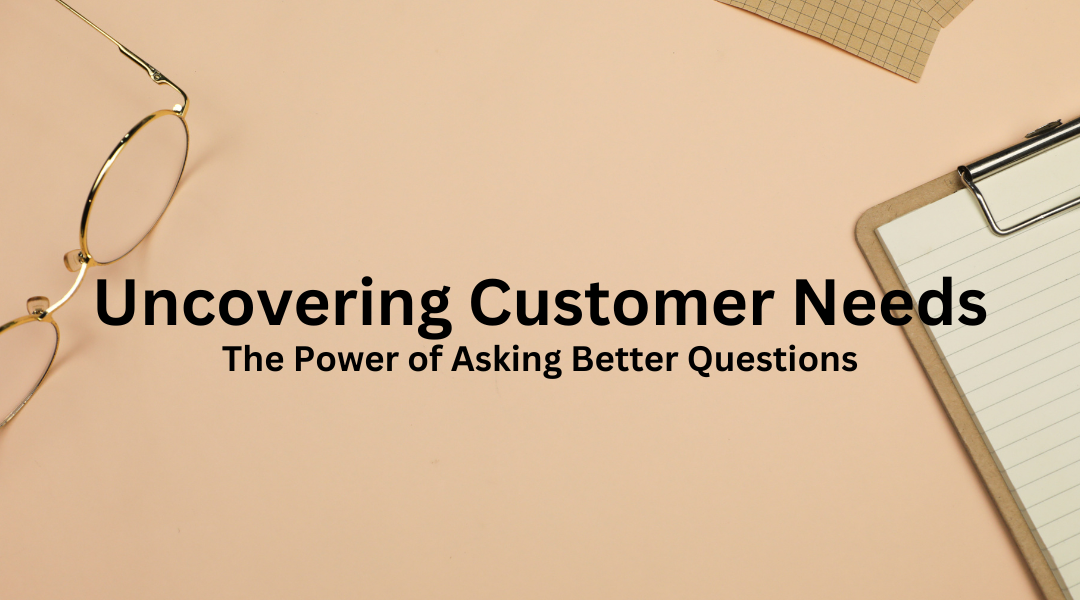Welcome to our latest video in the series on understanding and improving your B2B target market. Today, we’re diving into a crucial aspect of effective sales and business development: uncovering and understanding your customer’s needs. This topic is fundamental because, as we’ll explore, asking the right questions can lead to profound insights that drive your business forward.
The Importance of Asking Better Questions
At the heart of discovering customer needs lies the art of asking better questions. It’s not just about asking any question; it’s about asking the questions that uncover deep-seated challenges, desires, and opportunities for improvement. As the old adage goes, “Ask better questions, get better answers.” This principle holds true in B2B sales and beyond.
Let’s break down why asking better questions is crucial:
- Guiding the Conversation: When you ask open-ended questions like “What’s your biggest pain point?”, you might receive general answers. However, framing questions more precisely can guide the conversation towards specific insights. For example, asking, “Where did you feel that you wasted the most time during the last month?” directs the focus towards operational inefficiencies or time management issues.
- Uncovering Specific Needs: Following up on initial questions with more probing inquiries helps uncover specific needs. For instance, after identifying wasted time as a pain point, you could ask, “If you could condense that wasted time, what activities would you prioritize instead?” This approach reveals not only the problem but also potential solutions and priorities.
- Building a Solution Framework: Armed with insights from these questions, you can construct a solution framework tailored to your client’s needs. For example, if your product or service can save time, reduce costs, or enhance operational efficiency, you can quantify these benefits. This transforms the conversation from mere problem identification to a strategic discussion about value and impact.
Practical Steps for Understanding Customer Needs
To effectively uncover and understand customer needs, consider these practical steps:
- Create Buyer Personas: Develop detailed profiles of your target customers based on demographics, behavior patterns, motivations, and goals.
- Conduct Surveys and Focus Groups: Gather direct feedback from current and potential customers through surveys, focus groups, or direct conversations. This firsthand data provides invaluable insights into their challenges, preferences, and satisfaction with past solutions.
- Analyze Past Client Interactions: Review interactions with past clients to identify recurring themes, successful solutions, and areas for improvement. This retrospective analysis can guide future strategies and offerings.
- Adapt Across Verticals: If expanding into new verticals or industries, ensure thorough discovery through tailored questions. What works in one sector may not necessarily translate directly to another, highlighting the importance of adaptable questioning and segmentation.
Segmentation and Targeting Strategies
Effective segmentation hinges on a deep understanding of customer needs across different segments. By segmenting your audience based on their distinct needs and preferences, you can tailor your marketing messages, sales pitches, and product offerings more effectively. This targeted approach increases relevance and enhances customer engagement.
Conclusion
In conclusion, the journey to understanding and improving your B2B target market begins with asking better questions. By refining your questioning techniques, following up with insightful inquiries, and actively listening to customer responses, you can uncover profound insights that drive meaningful business growth. Remember, it’s not just about identifying pain points; it’s about crafting solutions that address those pain points effectively and efficiently.
Stay tuned for more insightful videos where we delve deeper into segmentation strategies and explore why understanding your target market at a deeper level is pivotal for sustained success in B2B sales and business development.
Book Recommendation
For more on asking questions, I recommend Good Leaders Ask Great Questions: Your Foundation for Successful Leadership by John Maxwell. The nature of every single conversation, interaction, and possible outcome can drastically change by the questions that we ask of others and ourselves. You can lead conversations better, learn more, and have significantly better sales experiences through the power of asking better questions.



